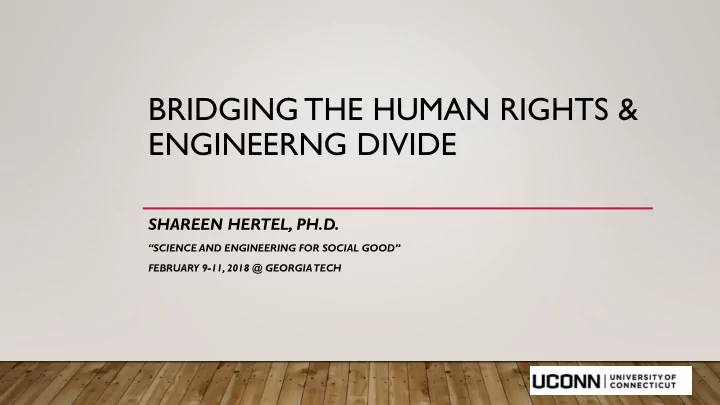

BRIDGING THE HUMAN RIGHTS & ENGINEERNG DIVIDE SHAREEN HERTEL, PH.D. “SCIENCE AND ENGINEERING FOR SOCIAL GOOD” FEBRUARY 9-11, 2018 @ GEORGIA TECH
WHY THE DIVIDE? • Human rights field: dominated by law, social science & humanities scholars • Engineering profession: guided by “Code of Ethics” (not HR -specific norms) Source: Software Engineering Ethics Institute; Itl HR Law Archives
WHY UNIVERSITY OF CONNECTICUT? • Pioneer in interdisciplinary HR research & teaching • Strong track record of practice-based research • Strong institutional commitment to: • Vendor supply chain management • Environmental sustainability Source: Sierra Club; UConn
INSTITUTIONALIZATION OF HUMAN RIGHTS & SUSTAINABILITY PRACTICE • Office of Environmental Policy: • https://envpolicy.uconn.edu/ • President’s Committee on Corporate Social Responsibility • https://csr.uconn.edu/ • Vendor Code of Conduct • https://policy.uconn.edu/2013/02/12/vendor-code-of-conduct/
EXISTING UCONN HUMAN RIGHTS CURRICULUM • 200 undergrad Human Rights Majors/Minors annually • University-wide • STEM track opens HR Minor to ENGR and other STEM students • https://humanrights.uconn.edu/wp-content/uploads/sites/767/2018/01/Advising-Tracks- HRTS-ENGR-1.2.18.pdf • 25+ grad students earn “HR Certificate” annually • UConn Law; School of Social Work; School of Education; College of Liberal Arts & Science
ONGOING COLLABORATIVE RESEARCH • NSF PIRE Grant (Ethiopia water project) • Provost Grant on Business & HR (global supply chains) Source: UConn Engineering; UConn School of Business
NEXT STEPS • Integrate STEM and HR more fully in grad curriculum Source: UConn Human Rights Institute; UConn Law; UConn School of ENGR
QUESTIONS? • Contact: • Shareen.Hertel@uconn.edu or 860 486 4129 • With thanks to: • National Center for Science and Civic Engagement; Georgia Institute of Technology; Stony Brook University; and the SUNY Louis Stokes Alliance for Minority Participation
Recommend
More recommend